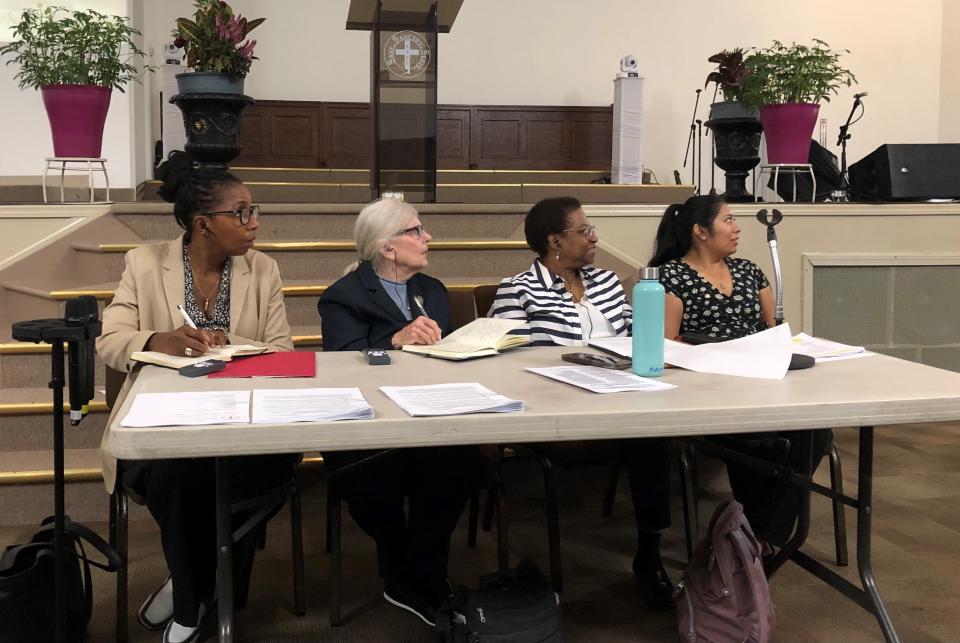State orders East Ramapo: Hike tax levy by 4.38% and use money on public school kids
State Education Commissioner Betty Rosa on Wednesday directed the East Ramapo school board to hike the tax levy by another 4.38% for 2024-2025, essentially endorsing the former superintendent's budget proposal that was rejected by the elected school board.
The extra property tax levy is to be exclusively used in support of the district's public schools, a state education department official said.
Rosa's order came in response to an appeal filed by a public school parent of two children. The commissioner made the dramatic move even though a full decision on the appeal remains pending.
The commissioner, for the second time in a week, included a stinging rebuke of the board, calling its budget “arbitrary, capricious, and violative of educational policy due to the ways in which it inequitably favors nonpublic school students at the expense of public school students.”
The move comes as the district faces a major deficit and ranks among the most dysfunctional in the state according to various education benchmarks.
The New York Civil Liberties Union filed the appeal on behalf of the parent to the state Education Department in July seeking more local tax dollars to help fund public schools.
Next steps
Rosa’s move to further increase the property tax levy — the total amount gathered by all property taxpayers in the district — would go before the school board. But the state’s monitors in East Ramapo have veto power on key items.
"That's the role of the monitors," said Regent Frances Wills, who represents the Lower Hudson Valley on the state Board of Regents.
“This is profound issue, a longstanding issue in this district where students have been denied opportunities for many, many years and there has been serious deprivation of the public school students,” Wills said Wednesday. "I support the commissioner wholeheartedly."

Rosa backing former superintendent's tax levy plan
Former Superintendent Clarence Ellis proposed a budget plan that would have increased the tax levy by 5.38%, the highest allowed under the state's property-tax levy cap. But the school board instead adopted a 1.99% tax levy increase, which was rejected by voters in May. A second proposal with a 1% levy increase was approved by voters in June, the first local tax increase in about a decade.
So Rosa is calling on the school board to implement Ellis' original plan.
Families of public-school students in the district, the majority of whom are English language learners, have reported a lack of teachers and adequate class space for kids. The district has among the highest rates of homeless students and among the lowest graduation rates and test scores in the state. More than 96% of students in the public schools are children of color.
Despite an ongoing $90 million building overhaul funded by federal COVID funds, the district’s facilities need at least $200 million more in repairs, officials have said. For example, drinking fountains in district schools have been turned off for eight years because of high lead levels; while COVID funds are being used to replace fixtures, just a fraction will be operational by fall.

Meanwhile, recurring deficits and a lack of local investment has led to a credit rating that’s just one step above junk. The district has been unable to obtain the standard short-term borrowing needed for operations.
About 10,000 children who live in the district attend public schools; another 30,000 go to private schools, mostly yeshivas. The district provides universal busing for all kids, and growing transportation costs have been cited again and again by various state-appointed monitors as a key stressor on district finances.
A majority of school board members are seen by the public school community as favoring the private-school community’s needs.
“The School Board and local voting majority has spent more than a decade systemically defunding public education — it’s an unlawful deprivation of students’ rights and it can’t go unchecked,” said Johanna Miller, Director of the Education Policy Center at the New York Civil Liberties Union.
Ana Maeda, a mother of two children in the East Ramapo schools, is the plaintiff in the appeal to the state. New Yorkers can appeal to the state education commissioner on a variety of matters pertaining to a school district's management.
“They’re denying our kids the essential resources they need to thrive, including special education and afterschool programs,” Maeda said in a statement. “Meanwhile, the school buildings are literally crumbling around them, and they can’t even access clean drinking water from the fountains!”
This article originally appeared on Rockland/Westchester Journal News: New York orders East Ramapo school board to hike taxes for public kids
